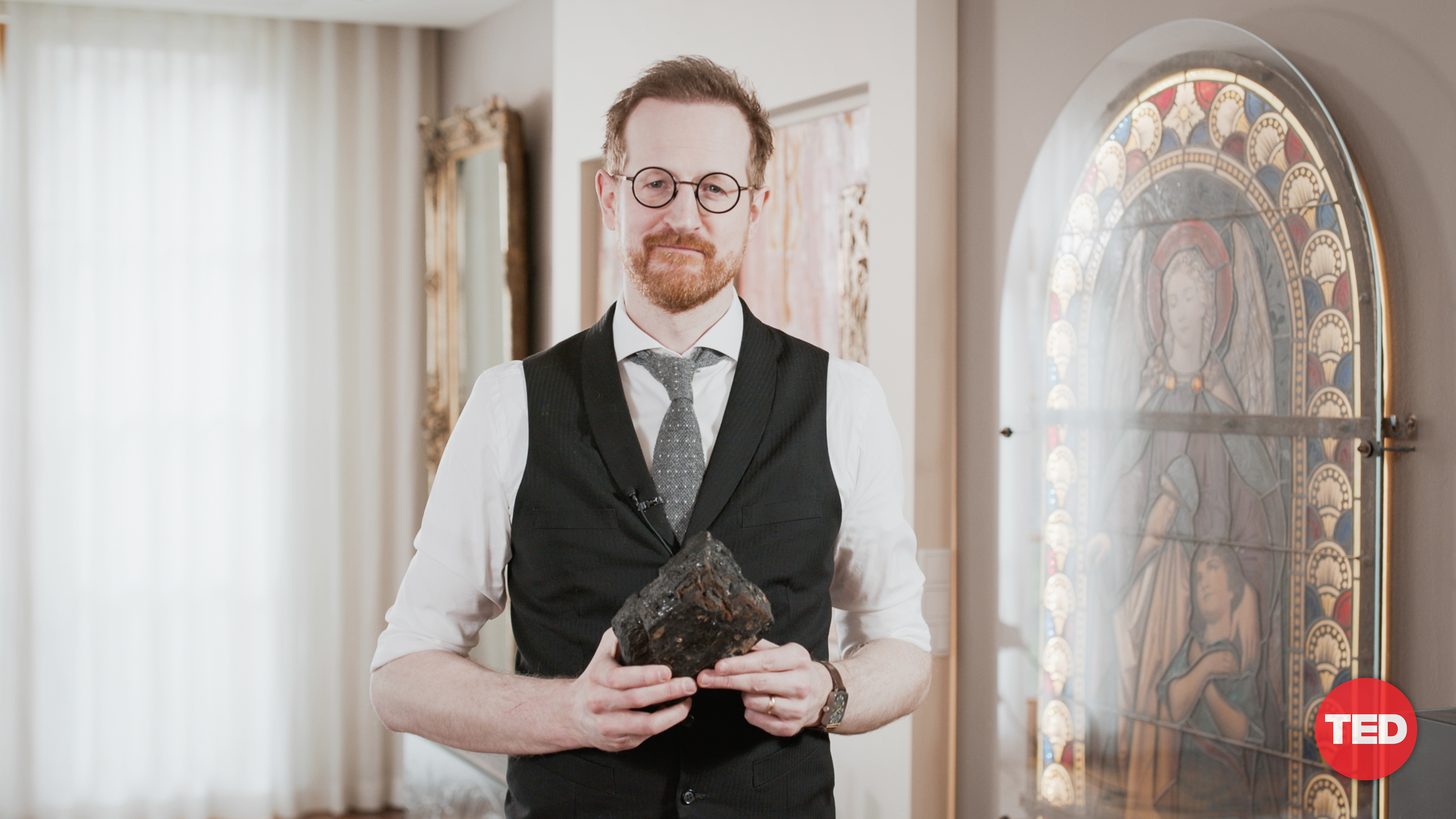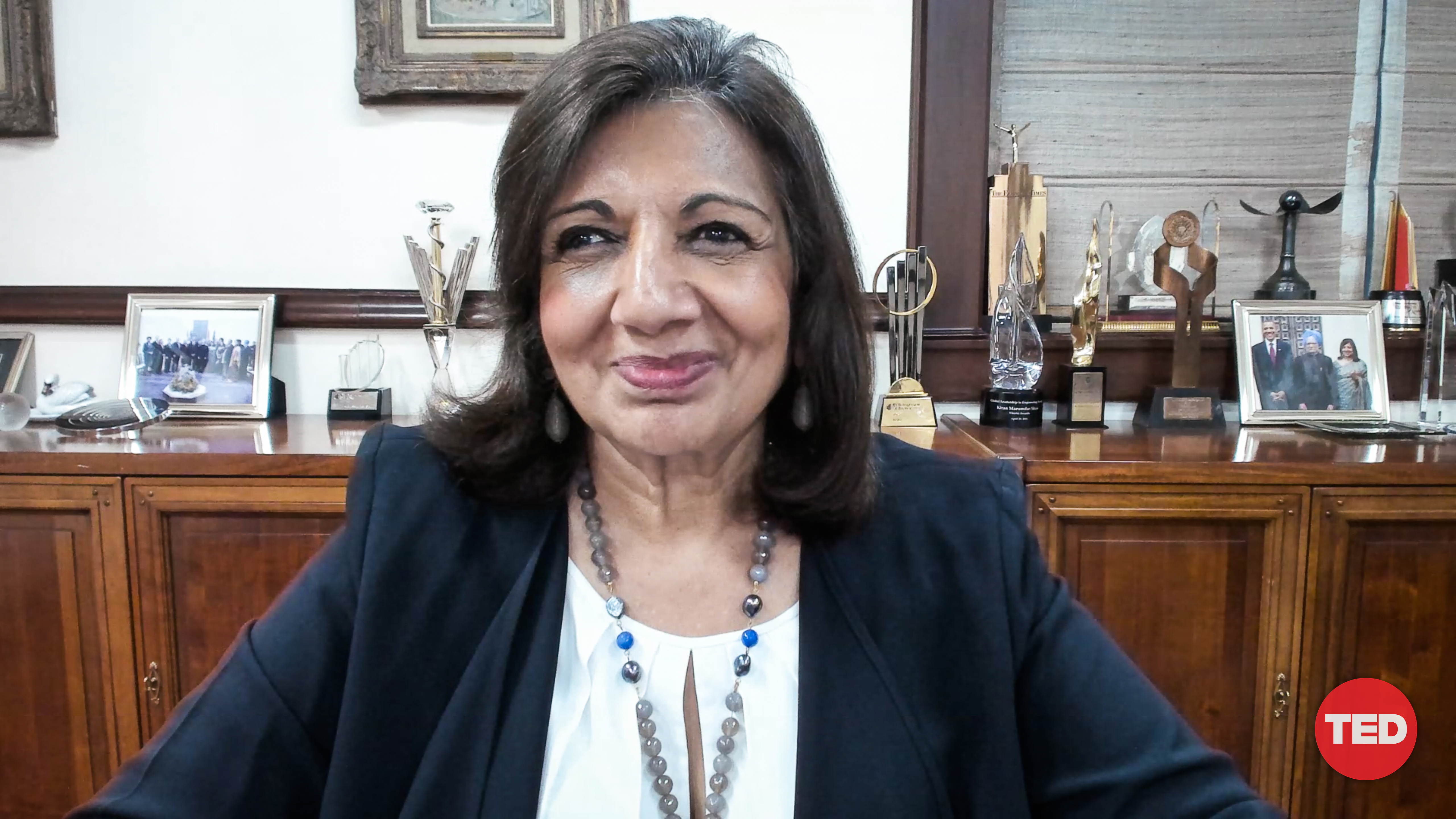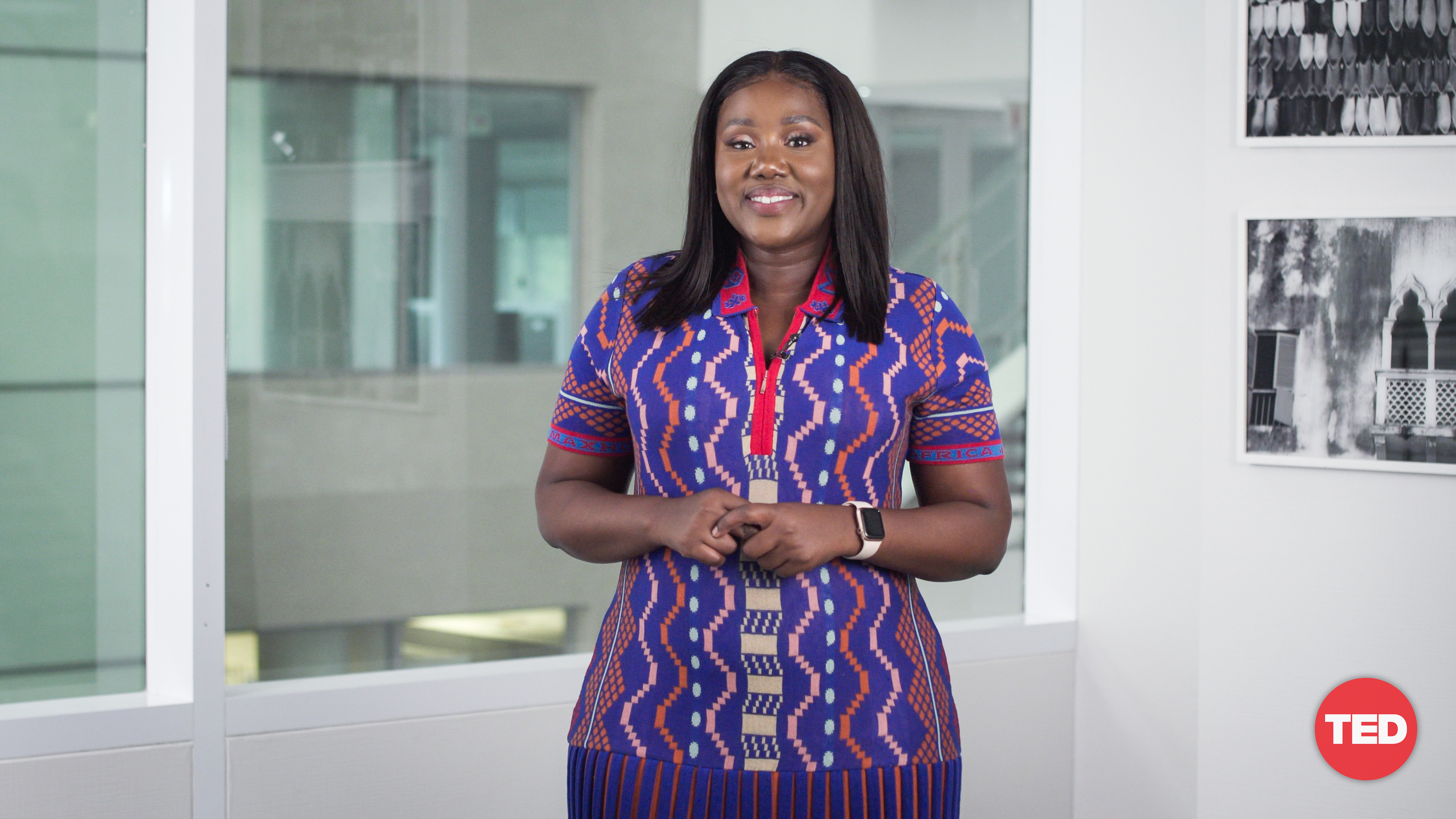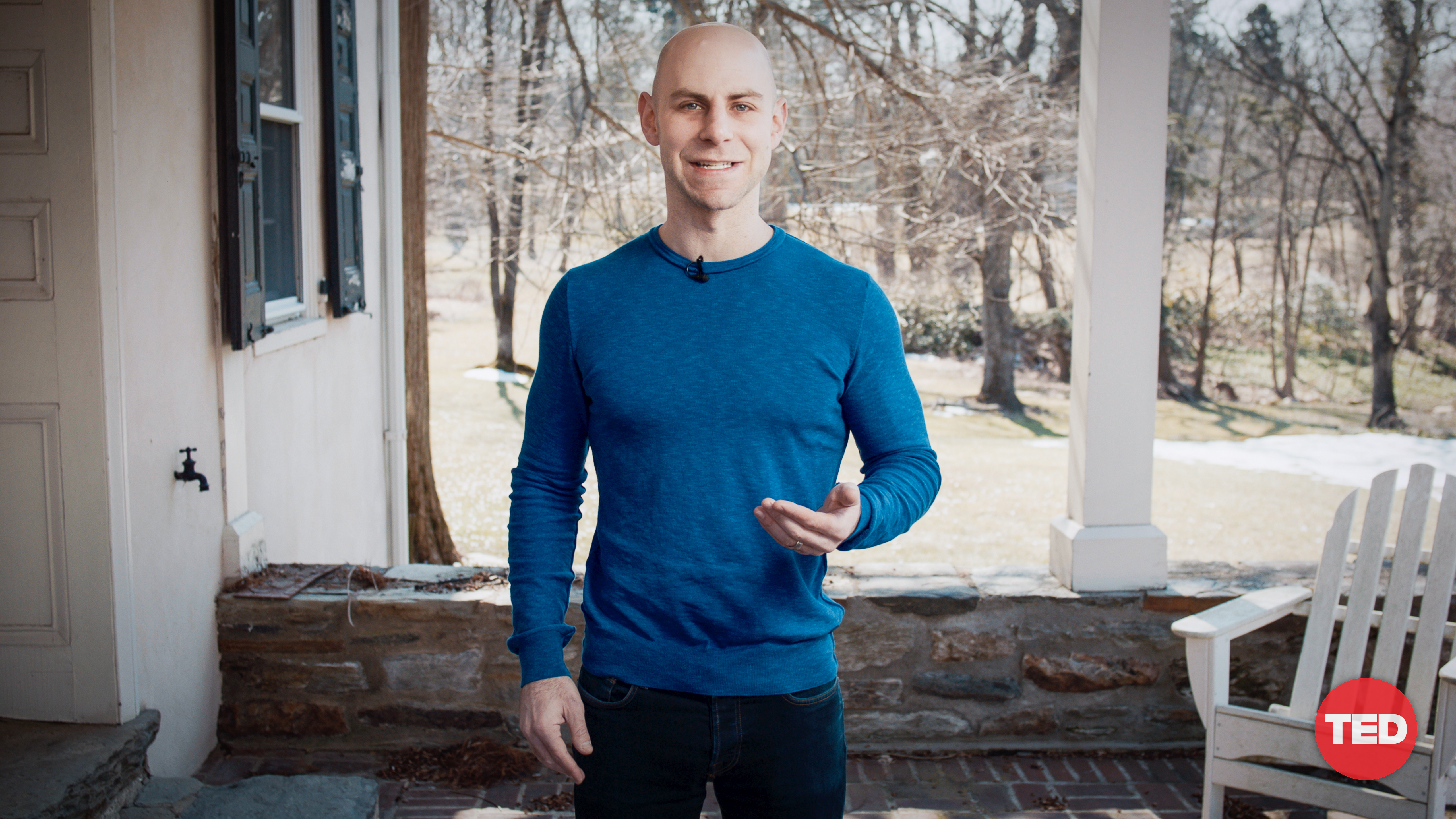
Would you pay two percent more for the carbon-neutral version of things you already buy? Tracing the journey of a lump of coal through the steelmaking supply chain, Jens Burchardt reveals the surprisingly cheap economics of low-carbon products. He speaks at TED@BCG on April 8, 2021. (Photo courtesy of TED)
Evolutions don’t happen overnight. After a year of slowing down and shifting priorities due to the pandemic, we can use this moment to find a better way forward. In a day of talks, interviews and performances, nine speakers and performers explored a range of innovative solutions aimed at addressing the climate crisis, cybersecurity, inequality, trust and more.
The event: TED@BCG: Evolutions is the tenth event TED and Boston Consulting Group have co-hosted to spotlight leading thinkers from around the globe and share their solutions for a better world. Hosted by TED’s Head of Partnerships Lisa Choi Owens, with opening remarks from Rich Lesser, CEO of BCG, and Chris Anderson, Head of TED.
Fun fact: TED@BCG events have generated 138 TED Talks, which have been viewed more 143 million times to date.
Music: Performance by neo-soul songstress MALIA.
The talks in brief:
Marcos Aguiar, digital trust advisor
Big idea: Trust plays a massive role in the success of businesses — and should be designed into their ecosystems.
How? Delivering on a promise or behaving in an expected way is key to earning a customer’s loyalty. Whether you’re scrolling through Facebook, hailing cars via Uber or booking a vacation on Airbnb, each business uses unique elements to win over consumers — oftentimes, with trust as their foundation. How can companies design with trust in mind? Sharing findings from a study that analyzed trust in business ecosystems, Marcos Aguiar offers a toolbox to building systemic trust that consists of seven elements: access; contracts with formalized terms and conditions; incentives to cooperate; control, or gentle guidance, that shapes behavior; transparency; intermediation; and mitigation when mishaps occur. While not all companies need every tool, he says, many will benefit greatly from three to six of them, depending on their industry. Aguiar encourages us all to consider the role trust plays in the platforms we use — and how it can improve our lives beyond them, too.
Anu Puusa, co-op enthusiast
Big idea: Cooperatives — businesses or other enterprises jointly owned, operated and controlled by their members — represent a sustainable model that can achieve long-term social, economic and environmental goals.
How? Cooperatives, also known as co-ops, are the invisible giant of the global economy, says Anu Puusa. Worldwide, there are more than three million co-ops, made up of one billion members, employing 280 million people and selling more than two trillion dollars in goods and services. How exactly do they work? Unlike most businesses, in which certain owners can buy power and influence, a co-op is fully owned by its members, who are also its customers and decision-makers. Each member has one vote, making each member an equal partner and owner in the business — whether the co-op is a farm, grocery store, bank, water supplier or any other organization. Co-ops find that sweet spot between for-profit businesses and the nonprofit world, Puusa says: while they do aim to make money, they also center members’ social and environmental goals and hope to anchor wealth in a community across generations. Because co-ops think in the long term rather than quarter to quarter, creating a sustainable business is the top priority. “Unlike capitalism, the cooperative movement is not broken,” Puusa says. “It just needs better marketing.”

Biotech pioneer Kiran Mazumdar-Shaw talks about equitable access to health care, the Indian biopharma industry and the essential role of international cooperation during the pandemic. She speaks with TED tech curator Simone Ross at TED@BCG on April 8, 2021. (Photo courtesy of TED)
Kiran Mazumdar-Shaw, biotech pioneer, in conversation with TED technology curator Simone Ross
Big idea: Key partnerships, global cooperation and a willingness to experiment with new ideas made COVID-19 vaccine development and distribution possible.
How? Kiran Mazumdar-Shaw, founder of Indian biopharmaceutical giant Biocon, discusses the development of COVID-19 vaccines, pointing to India’s critical role in the global vaccine supply chain and championing equitable health care access. Unlike many governments worldwide, the pharmaceutical industry formed key partnerships at the beginning of the coronavirus pandemic, which enabled the rapid development of vaccines and facilitated a wide-ranging distribution effort. Small biotech companies, such as BioNTech, Moderna and Novavax were first to create innovative vaccine programs when the virus hit. Importantly, they partnered with established pharmaceutical giants like Pfizer and Johnson & Johnson to fund, license and develop the vaccines and tap into the necessary networks and supply chains to distribute them. What’s more, Mazumdar-Shaw says, these “big Pharma” companies then partnered with each other to overcome production and manufacturing limitations and supply the world with millions of doses. From these partnerships, as well as equitable distribution initiatives like Cepi, COVAX and the Gates Foundation, she says, we’ve seen growing support for equitable access to health care.
Jens Burchardt, climate impact advocate
Big idea: Saving the planet doesn’t have to break the bank. By spending one to two percent more on eco-friendly products, consumers can help shift industries towards massively smaller (or non-existent) carbon footprints.
How? The steel industry is a highly competitive market — and a massive emitter of greenhouse gases. From the outset, the cost of transforming steelmaking into a low-carbon process would seem too high and potentially risky for suppliers. Jens Burchardt brings a fresh perspective to the challenge, walking us through the ins and outs of production in “hard-to-abate” (or energy-intensive) sectors. By tweaking the price consumers pay for products, he says, the world could take a huge step forward in lowering carbon emissions — and it may not be as expensive as we think. Using the example of an average European midsize sedan (which sells for approximately 30,000 euros), Burchardt breaks down the cost of materials — separate from assembly, marketing and other aspects of production — and calculates that it makes up only fifteen percent of the car’s total price. Companies could employ a low-carbon supplier and market their product as eco-friendly — for only 500 extra euros for consumers at the point of sale. For many industries, a greener world may not be as unreachable as once thought.

Want to do business in Africa? Emerging markets expert Nomava Zanazo shares four things companies need to understand about African customers. She speaks at TED@BCG on April 8, 2021. (Photo courtesy of TED)
Nomava Zanazo, emerging markets expert
Big idea: A message to businesses: stop assuming and get to know African consumers before you sell to them.
How? When looking to sell a new product or service in a country’s market, companies seek to understand the consumer base before jumping in, inquiring about aspects like shopping habits and brand loyalty. But when it comes to the African continent, they seem to abandon these considerations and lump assumptions broadly across its hyper-diverse 55 countries. Emerging markets expert (and South African) Nomava Zanazo gives a crash course on the everyday African spender. For example, Africans don’t want the cheapest product lines — but they do value brands and are much tech savvier than they’re given credit for. By debunking these misconceptions and myths, Zanazo encourages businesses to respect the African market and stop underestimating its consumers. Want your business to thrive in Africa? “Do the homework,” she says. “My continent is worth it.”
Nadya Bartol, cybersecurity leader
Big idea: We must remove the shame around cybersecurity mistakes in order to have safe digital lives.
How? We like to think of ourselves as confident and tech-savvy digital citizens. But many of us have accidentally downloaded a virus, been phished or had our identities stolen. Even software developers sometimes write insecure code without realizing it. These mistakes shouldn’t be hidden but highlighted in order to thwart future cybersecurity attacks, says Nadya Bartol — and we must start by lifting the shame. Much of modern life is computerized, from cars we drive to pacemakers that save lives, and anything digitally interconnected can be hacked. How do we truly stay safe in a digital world? Bartol suggests positive reinforcement and celebrated accountability to foster better, healthier cultures of cybersecurity. Only by being open and honest can we create an environment to learn, grow and protect ourselves in our hyperconnected world.
Beth Ford, farmer’s advocate, in conversation with TED business curator Corey Hajim
Big idea: US farmers face a wide range of challenges — from spotty broadband access to mounting climate disruptions. But there are also a variety of exciting solutions aimed at building 21st-century resilience.
How? As the CEO of Land O’Lakes, Beth Ford works to create a future for farmers that’s both environmentally and economically sustainable. Among many initiatives, she’s focused on expanding technology infrastructure, specifically by pushing for greater broadband access in rural areas. Many farming communities have little to no internet access, leaving children without remote learning opportunities and farmers without modern agricultural tech that requires bandwidth to operate. Ford is speaking with governments and other stakeholders in order to make broadband access a priority — and establish it as a basic right nationwide. She’s also helping farmers build out sustainable business practices in the face of climate volatility. Her team’s agronomists, for instance, work with farmers to get acre-by-acre insights into soil health; they’re also helping establish carbon credits, whereby farmers who reduce their carbon emissions can sell those offsets to other industries. It’s a climate-friendly approach that’s also profitable, Ford says — part of a wave of initiatives aimed at making farmers part of the solution.

We spend a lot of time trying to gain mastery over a set of skills or knowledge base. Adam Grant shows why it might be better to aspire not for mastery but rather being able to rethink what we think we know. He speaks at TED@BCG on April 8, 2021. (Photo courtesy of TED)
Adam Grant, organizational psychologist
Big idea: Confident humility allows us to remain flexible and rethink a situation, a critical skill in a rapidly changing world.
How? Most of us love trying on new clothes, eating at new restaurants and picking up new hobbies. But when it comes to our goals, identities and habits, we don’t like change — especially if it means giving up. Adam Grant digs into how we can avoid getting stuck in our same old ways of thinking and instead broaden our thought patterns and ourselves, even if it means choosing a path we didn’t originally envision. From an unlikely career as a diver to a fateful hike in Panama and a newfound hobby performing magic tricks, Grant shares examples from his own life that illustrate the confident humility needed to know “when to grit and when to quit.” Understanding when you’re in over your head or simply recognizing that you’re not on the right path is a crucial part of remaining flexible and dodging debilitating tunnel vision, so you can achieve your bigger goals.